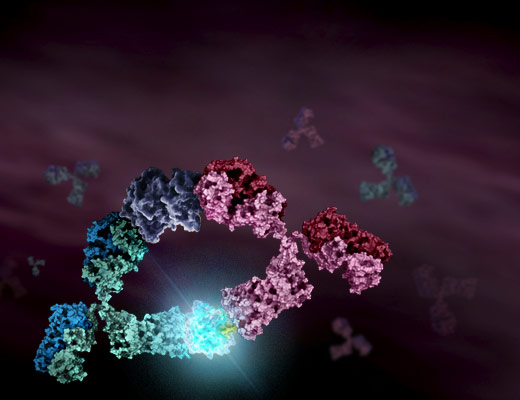Inflammation Assays
Inflammation is a key immune response to infection and cellular stress, often marked by the release of cytokines and other signaling molecules. Dysregulation of this process can lead to chronic conditions such as autoimmune and inflammatory diseases. Promega offers a comprehensive suite of assays to monitor inflammation markers.
Filter By
Shop all Inflammation Assays
Showing 0 of 21 Products
An Introduction to Inflammation Assays
What Is Inflammation?
Inflammation plays a central role in the body’s innate immune response, protecting us from infection and injury. However, chronic inflammation is implicated in a wide range of diseases, including neurodegenerative disorders, obesity, liver disorders, asthma, rheumatoid arthritis, inflammatory bowel syndrome, Alzheimer’s disease, type II diabetes and heart disease, making it a critical area of medical research. At the cellular level, inflammation involves a complex interplay of signaling molecules and inflammatory mediators that often trigger other signaling cascades involved in cell metabolism and oxidative stress. The ability to accurately measure key inflammatory markers has become vital for drug discovery and therapeutic development.
Inflammation Assays
Detection of inflammatory markers provides insight into processes tightly regulated in infection and cellular stress. These detection assays are optimal for multiplexing alongside additional markers of cell health. We offer a suite of tools for inflammation research, including those using Lumit® technology, to detect key markers with a simple “Add-Mix-Measure” protocol.
Cytokine Detection
Pro-inflammatory cytokines such as TNF-α, IL-2 and IFN-γ play critical roles in both innate and adaptive immune responses. These cytokines are involved in activating immune cells like T cells and regulating immune responses, making them important targets for inflammation research. Lumit® technology simplifies the detection of these essential cytokines with no-wash assays that are completed in just 70 minutes using a standard luminometer, allowing researchers to measure inflammatory activity quickly and efficiently. In addition to cytokine assays, Promega offers solutions for studying other key inflammatory mediators.

ATP Release
Extracellular ATP, a damage-associated molecular pattern (DAMP), is released during cell stress and death, acting as a signal to trigger immune responses. The RealTime-Glo™ Extracellular ATP Assay enables live-cell, kinetic detection of ATP release, providing valuable insights into inflammatory processes and aiding in the identification of immunogenic therapies.
Inflammasome Activation
While general inflammation is a major focus, research into the specific mechanisms of inflammasome activation is gaining attention. Inflammasomes are protein complexes formed in response to diverse inflammatory stimuli. They play a critical role in the activation of caspase-1, which leads to the release of cytokines IL-1β and IL-18 and induces pyroptosis, a form of programmed cell death. We offer several complementary assays to measure inflammasome activation, particularly the NLRP3 inflammasome, which has been implicated in various inflammatory diseases.
The Caspase-Glo® 1 Inflammasome Assay directly measures caspase-1 activation, while the Lumit® IL-1β Immunoassay detects IL-1β released from cells following inflammasome activation. Additionally, the NanoBRET® NLRP3 Assay allows researchers to quantify target engagement in live cells, providing a high-throughput solution for screening inflammasome modulators. These assays support drug discovery efforts focused on inflammasome inhibition and modulation.


